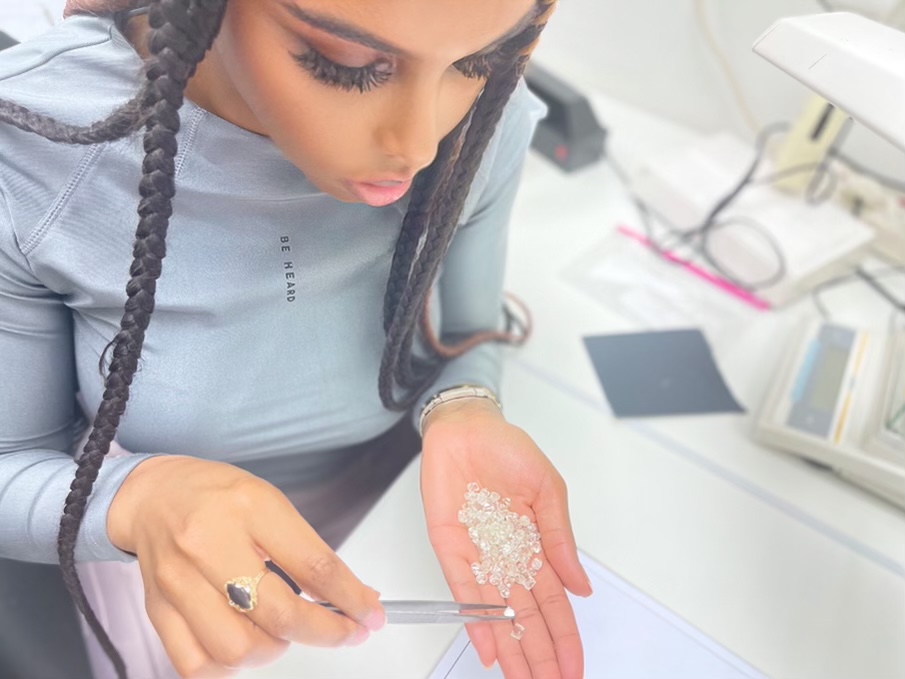Entrepreneur and diamond specialist Gina White wants to be as transparent as possible about how she wound up in the jewelry business. A bad jewelry purchase sparked the Bay Area native’s interest in gemstones and eventually led to a new career in the industry. But now, she’s on a mission to connect the African Diaspora through the stones.
“I was on the investment side of real estate,” White told Travel Noire. “That’s what I was doing. But I had a major lust for travel, and I just fell into this opportunity.”
For the past year, White has been “evaluating, procuring, designing, dealing, and wholesaling rough and polished diamonds” in South Africa. Along the way, she realized that her newfound passion could act as a catalyst to connect the African Diaspora to the rest of the world through investments and tourism.
Because of the paucity of Black women in rough diamond sourcing, White also saw this as a chance to help open doors for other women like herself.
“There are only seven accredited schools and only one here. That school is in South Florida. But analyzing rough stones? There are very few people who do that in general; woman, Black, or white. There’s history definitely being made here. I want to be a part of that conversation when they discuss the revolution and evolution that’s taking place on the continent. I want to be a name that people across the African Diaspora mention when I go back in decades.”
White sat down with Travel Noire to discuss the underrated value of jewelry, misconceptions about Africa, and her latest venture in Tanzania.
TN: You believe people across the African Diaspora underestimate the value of jewelry. Can you expound on that?
GW: When we’re buying jewelry, we treat it like it’s an unnecessary luxury. Real estate is typically one of the things that people think of as a true investment. But in the pandemic, we saw how real estate fluctuated all across the world. Your property might have been worth one thing, now it’s worth nothing compared to that. You might buy a car and as soon as you drive your car off the lot, it’s worth less. When we get houses and cars, we get appraisals, we get inspections. When we buy jewelry, we don’t do anything like that. We don’t get second opinions. We don’t know what we’re doing. Whatever the price was, we just throw it down, and jewelry holds its value better than homes and cars. If anything, it gains value, it backs our economy. It’s funny to me that people don’t treat it like an investment like they should. You can pass it down for generations. And also, once you own your jewelry, you own it for life. If you don’t pay taxes on your house, you lose your house. If you don’t pay your HOA fees on your condo, you can lose your condo. If you don’t pay your tax, title and registration on your vehicle, you can have it taken from you. So, we should treat jewelry just as serious as we treat those purchases.

TN: I also read that you source your diamonds from South Africa, specifically Johannesburg. How did you connect with that side of the world?
GW: I’ve always had a deep, personal connection to Africa. I have lots of friends in Africa, I have lots of family members in Africa. I think honestly, we all have lots of connections across the African Diaspora. We have just been xenophobic all our life about making those connections. First off, even if you don’t have a physical friend in South Africa, the world is at your fingertips, with social media, blogs, and email. We can just reach out and contact people. I happened to have contacts. I think as I talked to people about how do I get on that side of the world, people were like, ‘you know what, I do have a friend in Senegal. I do have a friend or auntie who married a man in Nigeria.’ We’re not far. The diaspora is so connected. The world has made us feel like we’re not. So I’m here to break up that stigma and perception of us. The bridge is already there. We just need to walk across it.
TN: I understand that you’re trying to bridge the two through investment and tourism. Explain exactly how that works.
GW: We have an initiative to have 100 Black entrepreneurs, influencers, and business people across the African Diaspora come out hopefully in the first quarter of 2022. That’s in progress right now. I’m super excited. We have expertise and things we don’t even really notice. It’s time that we help each other. Other cultures help each other, so that’s the goal. I want people to get over there [South Africa] to buy and to have fun. So it won’t just be business. We’re working on doing conferences and workshops to show them how to get into business in Africa, and to demystify a lot of the rumors people have about the continent. They’ll get to meet people in their industries. Honestly, even starting a business in America can be daunting. But, starting a business on the other side of the world? We’re going to help bridge that gap. This is exactly who you need to meet to get where you want to go, and this who you need to meet so that we can help your industry thrive.
TN: You mentioned misconceptions that people have about Africa. What are some of the ones that you’ve encountered that you really want to push back against?
GW: All of them! South Africa is a world-class city. People don’t know that. It’s up there with the New Yorks and the Singapores, especially if you’re in Cape Town. I will never forget the first time my friend knew I was going. She was like, make sure you pack tons of clothes because I doubt if they have malls there. I’m like these women dress better than us in America. They are more stylish than we are. Especially in South Africa, West Africa; those women are fashion icons and legends over there. They didn’t know that there were simply malls there. I went to the mall in Mandela Square and I saw Gucci, Prada, Louis, Dolce and Gabbana — every major high fashion brand is at their fingertips. People think there’s no Wi-Fi service. I mean, I’m standing next to a high-rise building that’s 40 stories high. I get Uber Eats over there. And honestly, I’ve had recreational experiences that I would have never been able to experience in the States.
TN: What do you have in the works business-wise?
GW: I have a documentary coming out so you’ll get to see the process of my different collections. For instance, I’m working on a Tanzanite collection right now. You’re going to actually see me in the mines in Tanzania sourcing Tanzanite. So every stone that you would buy from me, I’ve touched, I’ve sourced, and I’ve purchased. I’ve been part of the cutting process from rough to the jewelry display. So you will know exactly the story behind the stone. And that’s kind of what makes my brand different from anyone else’s. I’ll have two sides of the business. I’ll have a line of jewelry that’s already predesigned. You can just click it and purchase it straight from me, and it’ll be a Gina White exclusive. But then if you want a custom piece, that’s a different process, and that’ll be on the site as well.
Follow Gina’s work on Instagram.
This interview has been edited and condensed for brevity and clarity.
